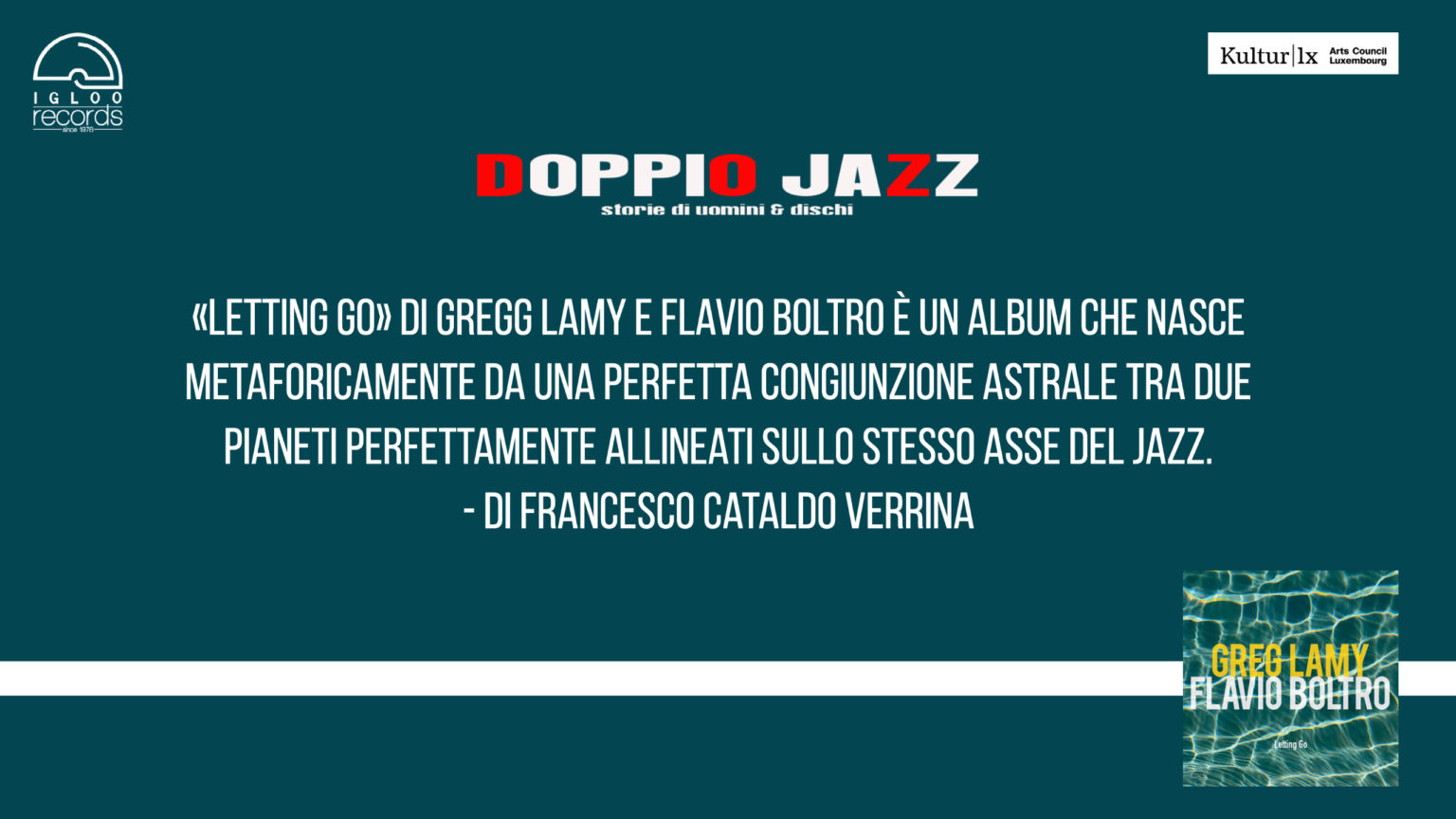
// by Francesco Cataldo Verrina // Translated from Italian
Over the last few decades, collaborations between musicians from different geographical areas of the old continent have led to a qualitative rise in European jazz compared to American jazz: the confluence of styles and experiences always produces a genetic evolution of the species, especially when one acts inter pares, without hierarchies and subordination, in order to find a neuralgic point of confluence that acts as a driving force for ideas. A glaring case in point with tangible results concerns Gregg Lamy and Flavio Boltro, two different personalities in terms of imprinting but confluent and compensatory, whose collaboration offers a decidedly broader perspective of what contemporary European jazz not only claims to be or to know how to do but also tangibly demonstrates with facts in hand. “Gregg Lamy and Flavio Boltro’s ‘Letting Go’ is an album metaphorically born of a perfect astral conjunction between two planets perfectly aligned on the same jazz axis. It takes only a few measures and already halfway through the first track it is clear that the synergy between the Luxembourgish guitarist and the Italian trumpeter reaches almost symbiotic levels, through a constant osmotic exchange corroborated by the presence of two other high-ranking sodalists, Gautier Laurent on bass and Jean-Marc Robin on drums, telepathically integrated and well disposed to support the basic assumptions of the project. It must be said at once that the partnership between Lamy and Boltro goes back a long way and is linked to three previous albums: ‘Meeting’ (2013), ‘Press Enter’ (2017) and ‘Observe The Silence’ (2021).
With ‘Letting Go’, Boltro becomes an active and proactive voice in the project’s concept and Lamy’s other half of the sky, while the guitarist discovers in him a confident ally, through a complicity honed during numerous concerts in Europe before even considering a recording. ‘I knew we would also bond in the studio,’ declared Boltro. And so it was: the automatisms were refined and the cohesion between the musicians strengthened, while the sound flow of the album is played on an almost jam session-like spontaneity. The recorded material comes from ‘direct takes’: six compositions are by the Luxembourgian guitarist and three by the Piedmontese trumpeter; in addition, Boltro suggested a classic from Pino Daniele’s repertoire, ‘Chi Tene O’ Mare’, almost a warning related to the environmental disasters and ecological catastrophes of our time. “Letting Go” substantiates itself as a perfect link between contemporaneity and tradition both in terms of composition and execution, in which the lightness of the arrangements and a calibrated and spaced out comping that avoids any excess of redundant virtuosity as an end in itself stand out. The four musicians seem to converse with an uninhibited naturalness and an almost mercurial listening ability: interplay thus becomes one of the album’s trump cards. Recorded at the Studio des Bruères, Poitiers, in July 2022, ‘Letting Go’ becomes a thermometer to measure the good health of European jazz with international aspirations.
The album opens with ‘Bridge House’, a composition with an iridescent mood and introspective atmosphere, where spaces take on the value of connective tissue, bringing to mind pre-electric Miles and certain vaguely progressive settings halfway between Pat Metheny and Pink Floyd. “Coccinelle” is a modal construct sustained by a pressing rhythmic structure, which is contrasted by a thematic development based on an immediate singability. “Alba Marina” is characterised as a metropolitan ballad with a soulful flavour, but warmed in melody by a gentle Mediterranean warmth, supported by the alternation between the two frontline instruments and guided by perfect comping from the back. “Let’s Fly” is substantiated as a mid-range, with fickle moods and repeated changes of pace; above all, the theme’s mood variability marks the transition from a retro-flavoured melody to an oblique and impervious improvisational game. “My Dearest (For Camille Part II) is based on a dilated, descriptive, almost cinematic sound architecture, strong on a fast-paced melody, in which Lamy’s guitar seems to be the picklock that opens up all of Boltro’s expository spaces. “Onirica” has the features of a bronze and melancholic ballad, almost suspended and dreamy, in which guitar and trumpet make promises for eternity, externalizing a profound lyricism. “Enfin” is almost a hymn, a free song declaimed in a pained voice by the trumpet supported by a funkified, marching groove, while the guitar takes on deep, yearning colours. “Daddy & Daughter”, takes on the somatic traits of a suspension chamber, developing an ambient atmosphere where the crossfire of trumpet and guitar produce a piercing pathos. “Ike” is a long guitar progression, an expositional showcase for Lamy who unleashes all his creative demons. In closing, Pino Daniele’s “Chi Tene O’ Mare” is returned to the world of men through an embrace of notes that ooze with poetry: the guitar reaches abysmal depths, while the trumpet rediscovers all its Mediterranean genetic makeup. Since the human ear possesses characteristics of uniqueness like fingerprints, after all, those described are only suggestions, and Gregg Lamy and Flavio Boltro’s “Letting Go” offers so many of them that the perceptual dynamics seem to change pleasantly with each listening. All this on Planet Earth is still called jazz.

